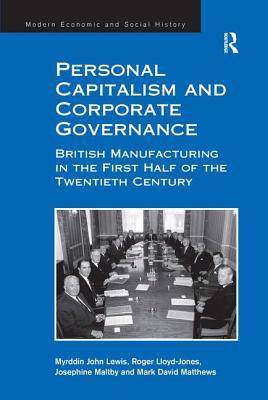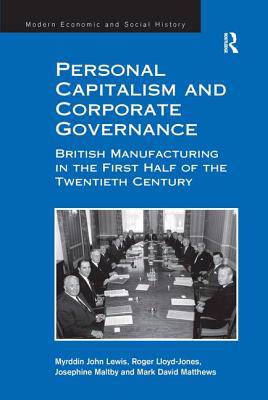
Bedankt voor het vertrouwen het afgelopen jaar! Om jou te bedanken bieden we GRATIS verzending (in België) aan op alles gedurende de hele maand januari.
- Afhalen na 1 uur in een winkel met voorraad
- In januari gratis thuislevering in België
- Ruim aanbod met 7 miljoen producten
Bedankt voor het vertrouwen het afgelopen jaar! Om jou te bedanken bieden we GRATIS verzending (in België) aan op alles gedurende de hele maand januari.
- Afhalen na 1 uur in een winkel met voorraad
- In januari gratis thuislevering in België
- Ruim aanbod met 7 miljoen producten
Zoeken
Personal Capitalism and Corporate Governance
British Manufacturing in the First Half of the Twentieth Century
Myrddin John Lewis, Roger Lloyd-Jones, Mark David Matthews
€ 305,45
+ 610 punten
Omschrijving
This book is specifically aimed at addressing a gap in the study of the evolution of corporate governance in Britain. In particular its key theme, the relationship between corporate governance and personal capitalism in British manufacturing in the first half of the twentieth century, provides the means for a systematic and critical examination of the dominant Chandlerian paradigm that the long-running persistence of personal capitalism shaped the governance of British manufacturing firms well into the twentieth century and acted to erode their competitive performance. The book helps to identify those aspects of corporate governance that have undergone change, with some critical observations on the magnitude of change and those aspects which have displayed characteristics of continuity. The empirical spine of this book is set out in a series of case studies which provide the basis for the examination of corporate governance in Britain during the period c. 1900 to 1950. By focusing particularly on the responses of a range of businesses to the turbulent environment of the inter-war years, this volume offers an insight into a much neglected, yet vital, area of business and economic history.
Specificaties
Betrokkenen
- Auteur(s):
- Uitgeverij:
Inhoud
- Aantal bladzijden:
- 250
- Taal:
- Engels
- Reeks:
Eigenschappen
- Productcode (EAN):
- 9780754655879
- Verschijningsdatum:
- 28/02/2011
- Uitvoering:
- Hardcover
- Formaat:
- Genaaid
- Afmetingen:
- 156 mm x 234 mm
- Gewicht:
- 530 g

Alleen bij Standaard Boekhandel
+ 610 punten op je klantenkaart van Standaard Boekhandel
Beoordelingen
We publiceren alleen reviews die voldoen aan de voorwaarden voor reviews. Bekijk onze voorwaarden voor reviews.









